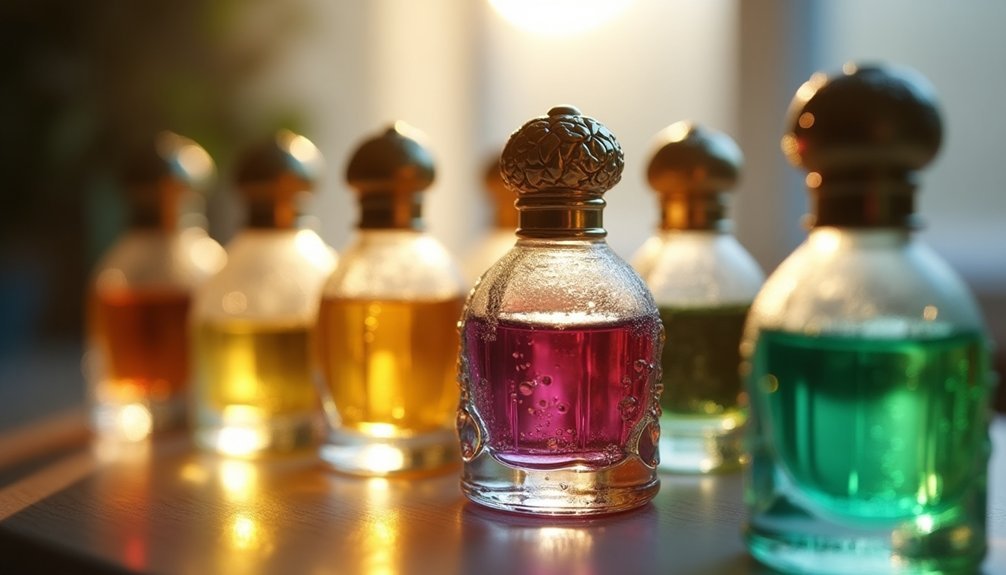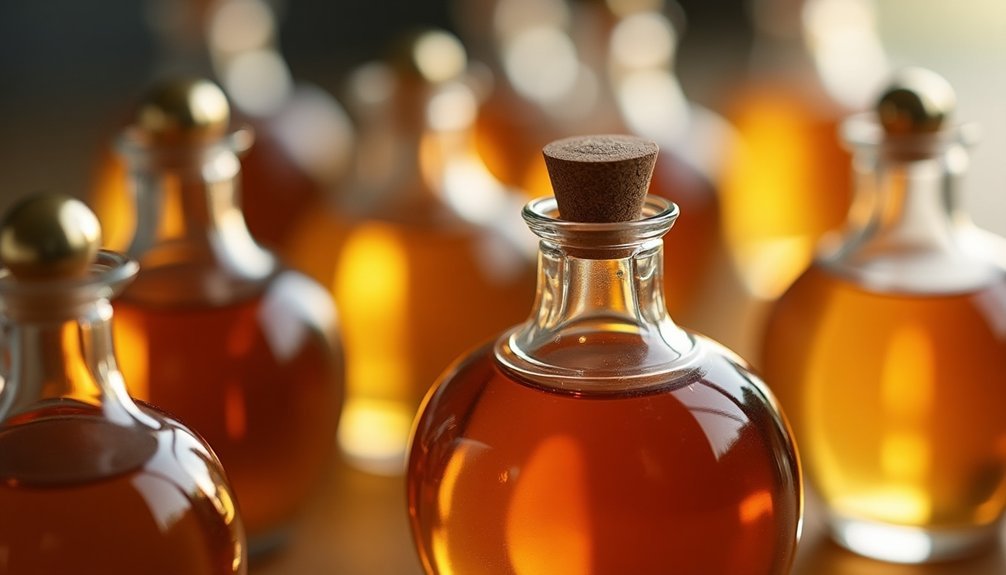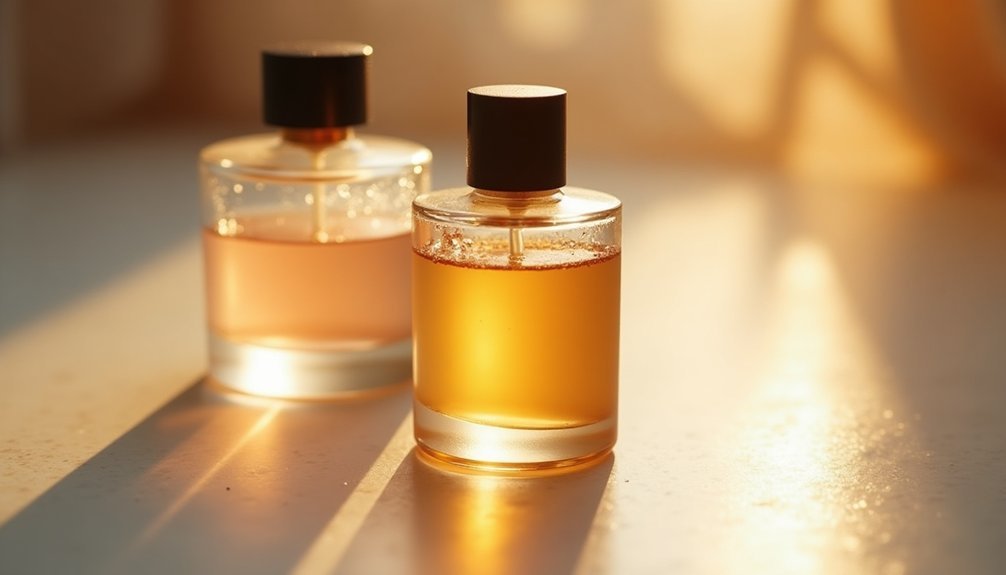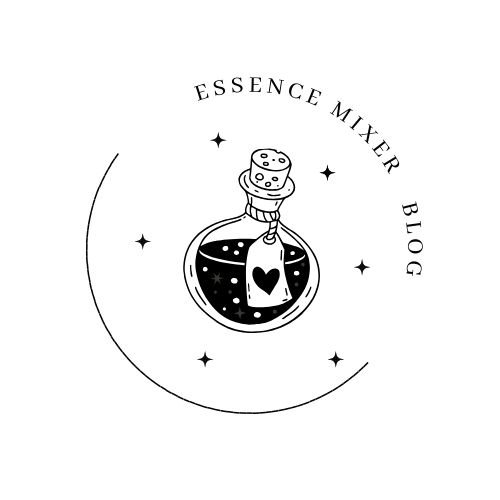Your fragrance will age better in smaller bottles because they minimize air exposure and slow down oxidation. When you have less empty space above the perfume, there's a reduced air-to-liquid ratio that helps preserve the original scent profile and maintains chemical stability. You'll find that 30ml bottles can keep fragrances fresh for 2-3 years, while larger 100ml+ bottles may deteriorate within months. The science behind this preservation process reveals fascinating insights about perfume longevity.
The Science Behind Perfume Oxidation Rates

Three key factors govern how quickly your perfume oxidizes: air exposure, container size, and surface area.
When you choose smaller bottles for your fragrances, you're actually helping preserve their integrity through reduced air interaction. The science is straightforward – less air space means slower oxidation rates and better maintenance of the original scent profile.
You'll find that volatile compounds, which give perfumes their distinctive characteristics, remain more stable in smaller containers. This is because there's simply less room for these compounds to evaporate or break down.
When you opt for larger bottles, you're inadvertently exposing your fragrance to more air, which accelerates the aging process. That's why fragrances in smaller bottles maintain their intended composition longer, preserving the delicate balance of notes you've invested in.
Optimal Storage Volumes for Long-Term Preservation
Understanding ideal storage volumes builds directly on these oxidation principles. When you're storing fragrances long-term, smaller bottles offer significant advantages for maintaining scent integrity.
You'll find that reduced volume means less air exposure within the container, which dramatically slows the oxidation process that can alter your perfume's character.
Optimal storage isn't just about size – it's about efficiency. Smaller bottles are easier to keep in ideal conditions, protecting your fragrance from environmental factors that accelerate aging.
Smart storage maximizes fragrance longevity. Compact bottles provide better protection against environmental stress, ensuring your scents stay fresh longer.
You're also making an eco-friendly choice, as compact containers require fewer materials. The concentrated oils in smaller volumes maintain their potency better, ensuring you'll use up the perfume before it has a chance to degrade.
Air-to-Liquid Ratio Effects on Fragrance Notes

Your perfume's fragrance notes stay fresher in smaller bottles because the reduced air-to-liquid ratio limits oxidation, which can alter or degrade the scent.
The concentrated notes maintain their intended character longer since there's less empty space for air to interact with the liquid perfume.
With better preservation through minimal air exposure, you'll enjoy your fragrance's authentic composition for an extended period.
Oxidation's Impact On Scent
While perfume enthusiasts often focus on the scent itself, the air-to-liquid ratio in a bottle plays a crucial role in maintaining a fragrance's integrity.
When you choose smaller bottles, you're actually helping preserve your perfume's intended character due to reduced oxidation exposure.
In larger bottles, excess air accelerates the oxidation process, causing your fragrance to deteriorate faster. You'll notice top notes fading and unwanted scents emerging as chemical changes occur.
However, smaller bottles minimize this air-to-liquid ratio, markedly slowing down oxidation and extending your perfume's longevity.
Concentrated Notes Stay Fresh
For anyone seeking to maintain their fragrance's complex character, smaller perfume bottles deliver a significant advantage through their concentrated formulation.
The concentrated nature of these bottles creates ideal conditions for preserving your fragrance oils, ensuring they retain their potency and resist oxidation.
You'll experience these key benefits with smaller bottles:
- Enhanced freshness due to minimal air exposure, protecting volatile components from premature evaporation
- Better preservation of nuanced notes, allowing the scent to develop as intended by the perfumer
- More concentrated fragrance oils that maintain their original intensity longer
- Reduced risk of degradation, keeping top, middle, and base notes true to their character
The science is clear: when you choose smaller bottles, you're ensuring your favorite scent stays vibrant and authentic throughout its use.
Less Space, Better Preservation
When selecting perfume bottles, size plays an essential role in preserving your fragrance's quality through the air-to-liquid ratio.
You'll find that smaller bottles create less space for air exposure, which considerably reduces oxidation and helps maintain your perfume's intended scent profile.
The compact design of smaller bottles offers superior preservation benefits you won't get with larger containers.
You'll experience better protection of delicate ingredients, as the limited air space prevents excessive evaporation of volatile compounds. This means your fragrance's top, middle, and base notes stay balanced longer.
Additionally, the smaller size helps shield your perfume from light exposure, preventing photodegradation that can alter its chemistry.
Temperature Stability in Different Bottle Sizes

Although perfume quality depends on various factors, bottle size plays a crucial role in maintaining temperature stability. When you store your fragrance in smaller bottles, you'll benefit from better temperature regulation compared to larger containers. The reduced volume helps protect against oxidation and maintains consistent conditions that prevent premature aging.
Here's why smaller bottles offer superior temperature stability:
- Less air space means minimal temperature fluctuations inside the bottle
- Compact sizes are easier to store in ideal cool, dark environments
- Smaller volumes respond more quickly to temperature changes, making them easier to protect
- The reduced mass helps maintain stable conditions throughout the storage period
You'll find that these temperature advantages, combined with proper storage practices, will help your fragrance maintain its intended scent profile for longer periods.
Impact of Bottle Material on Aging Process
Your perfume's longevity largely depends on the quality of glass used in smaller bottles, which creates an impenetrable shield against harmful environmental factors.
The specialized glass materials in these bottles work alongside UV-protective coatings to minimize light exposure that could otherwise break down your fragrance's molecular structure.
You'll find that smaller bottles maintain more consistent temperatures due to their compact size and superior glass composition, helping preserve your perfume's original scent profile.
Glass Quality Affects Preservation
Since fragrance preservation largely depends on packaging materials, the quality of glass used in smaller perfume bottles plays a crucial role in maintaining scent integrity.
The high-grade glass in these containers provides superior UV protection and oxidation reduction, helping your fragrance stay fresh longer.
You'll find these premium smaller bottles offer several preservation advantages:
- Thicker glass construction creates a stronger barrier against air exposure and environmental factors
- Dark or opaque glass materials shield your fragrance from harmful UV rays that can alter its chemical composition
- Advanced airtight seals prevent unwanted evaporation and contamination
- Limited air space within the bottle reduces oxidation potential
These quality features work together to create an ideal storage environment that protects your fragrance from degradation, ensuring it maintains its intended scent profile throughout its use.
Light Exposure Impact Factors
When considering fragrance longevity, the relationship between bottle material and light exposure becomes a critical factor in the aging process.
You'll find that smaller bottles often utilize darker, more opaque glass materials that effectively shield your perfume from harmful light exposure, which can trigger unwanted chemical reactions and alter the scent's composition.
These smaller bottles offer additional advantages in preserving your fragrance. The thicker glass provides superior insulation against temperature changes, while the reduced volume means you're opening the bottle less frequently, limiting oxidation.
Since you'll likely use up the contents more quickly, there's less time for light-induced degradation to occur. The combination of protective glass properties and reduced exposure time helps maintain your perfume's original scent profile, ensuring it stays fresh and true to its intended character.
Temperature Control Benefits
The material composition of smaller perfume bottles plays an essential role in maintaining stable temperatures for your fragrance. The enhanced temperature control capabilities of these compact containers directly influence fragrance aging and help preserve your scent's original characteristics.
- Smaller bottles feature thicker glass or specialized materials that provide superior insulation against harmful temperature fluctuations.
- The compact design naturally fits into controlled environments like makeup bags and purses, protecting your fragrance from extreme temperatures.
- Reduced air space within smaller bottles minimizes the oxidation process, maintaining fragrance integrity.
- Temperature-stable materials work alongside light-protective features to create a dual defense system for your perfume.
These temperature control benefits make smaller bottles an ideal choice for preserving your favorite fragrances, ensuring they maintain their intended scent profile throughout their use.
Measuring Scent Degradation Over Time
Understanding how perfumes age requires careful observation of their scent degradation patterns over time. You'll notice that smaller bottles markedly reduce the oxidation process, helping maintain fragrance integrity longer. When you monitor your perfume's aging, you'll find that limited air exposure in compact containers preserves the original notes better than larger bottles.
| Bottle Size | Degradation Rate | Scent Stability |
|---|---|---|
| 30ml or less | Very Slow | 2-3 years |
| 50ml | Moderate | 1-2 years |
| 100ml | Fast | 6-12 months |
| 200ml+ | Very Fast | 3-6 months |
Light Exposure and Container Dimensions
Smaller perfume bottles offer strategic advantages beyond their convenient size, particularly regarding light exposure and preservation. The compact container dimensions create a prime environment for maintaining fragrance integrity, greatly reducing the risks of oxidation and degradation.
When you choose smaller bottles, you'll benefit from:
- Limited air exposure due to reduced surface area, preventing premature scent breakdown
- Minimal light exposure thanks to compact dimensions, protecting against UV damage
- Better storage options that keep fragrances away from direct sunlight
- Decreased evaporation risk due to smaller air volume inside the container
These physical attributes work together to shield your perfume from environmental factors that typically accelerate aging.
You'll find that smaller bottles naturally encourage better preservation practices, helping your favorite scents maintain their intended character for longer periods.
Evaporation Rates Across Bottle Capacities
When considering fragrance longevity, bottle capacity plays a crucial role in determining evaporation rates. You'll find that smaller bottles maintain fragrance integrity better due to their reduced air-to-fragrance ratio. While larger bottles might seem like a better value, they're more susceptible to rapid evaporation and loss of potency.
| Bottle Size | Evaporation Rate | Longevity |
|---|---|---|
| 30ml | Minimal | 2+ years |
| 50ml | Moderate | 1-2 years |
| 100ml+ | High | <1 year |
| 200ml+ | Very High | 6 months |
If you're looking to preserve your fragrance's original scent profile, opt for bottles around 30ml. They provide a more controlled environment with tighter seals and limited oxygen exposure, ensuring your perfume maintains its intended characteristics longer than larger bottles that experience accelerated degradation.
Chemical Stability in Concentrated Forms
The chemical composition of concentrated perfumes benefits markedly from smaller bottle formats. When you choose concentrated forms in smaller vessels, you'll find enhanced chemical stability due to the higher ratio of fragrance oils to alcohol.
These concentrated formulations protect your perfume from degradation through several key mechanisms.
- Limited air exposure reduces oxidation, keeping your fragrance's molecular structure intact
- Advanced sealing mechanisms create superior barriers against environmental factors
- Higher concentration of fragrance oils maintains the scent's original character
- Reduced volume minimizes evaporation, preserving the fragrance composition
You'll notice your perfume's quality stays consistent longer because the concentrated format allows for gradual scent release.
This slower diffusion means you're getting the full benefit of each fragrance note, exactly as the perfumer intended, throughout the entire lifespan of your bottle.
Testing Methods for Fragrance Longevity
You'll find that controlled storage environment testing reveals how smaller perfume bottles maintain their scent profile longer through systematic temperature and humidity monitoring.
When evaluating skin chemistry interactions, researchers track how fragrances from different bottle sizes react with your natural oils and pH levels over time.
Duration tracking techniques measure evaporation rates and chemical stability through specialized instruments that compare scent preservation between various bottle volumes.
Storage Environment Testing Methods
Testing fragrance longevity requires precise environmental controls and systematic evaluation methods. You'll need to establish controlled storage environments that minimize factors affecting your fragrance's scent profile.
Smaller bottles play an essential role in reducing the oxidation process, while light-proof materials protect against UV damage.
To effectively test storage environments, consider these key factors:
- Maintain a consistent cool temperature to prevent degradation from temperature fluctuations
- Store samples in both small and large bottles to compare aging differences
- Use dark, temperature-controlled spaces for all test samples
- Conduct regular assessments to track changes in scent intensity and character
Skin Chemistry Evaluation Process
Because individual skin chemistry plays an essential role in fragrance performance, evaluating perfume longevity requires a systematic approach across different skin types.
You'll want to follow established testing methods by applying the fragrance to various skin areas and tracking its evolution at 1, 3, and 6-hour intervals.
To guarantee accurate results, you should consider factors like your skin's hydration levels and natural oils, which directly affect sillage and scent development.
Since subjective perceptions can vary widely, it's helpful to participate in blind testing with other fragrance enthusiasts.
This thorough evaluation process helps you understand how your unique skin chemistry interacts with different perfumes, leading to more informed purchasing decisions.
You'll discover which fragrances not only smell great initially but also maintain their intended character throughout the day.
Duration Tracking Techniques
Determining a fragrance's true longevity requires systematic tracking methods that go beyond simple first impressions.
You'll need to employ specific duration tracking techniques under controlled conditions to accurately measure fragrance performance over time.
To effectively evaluate scent perception and the aging process, consider these essential testing methods:
- Apply the fragrance at consistent intervals and document its strength at predetermined time markers
- Maintain stable temperature and humidity levels to eliminate external variables affecting performance
- Record subjective feedback about the scent's characteristics at 1-hour, 4-hour, and 8-hour intervals
- Use advanced analytical tools like gas chromatography to study changes in chemical composition
These methodical approaches will help you understand how your fragrance evolves throughout its wear time, providing valuable insights into its true longevity and aging characteristics.
Storage Duration Based on Container Size
When selecting perfume bottle sizes, understanding their storage duration can greatly impact your fragrance's longevity.
You'll find that smaller bottles provide significant advantages in preserving your perfume's quality over time. The reduced air exposure in these containers minimizes oxidation, helping maintain the concentrated formula's freshness longer than larger bottles.
You'll notice that environmental factors like light and temperature changes have less impact on smaller bottles, which better protect your fragrance from scent degradation.
Since you're likely to use up a smaller quantity faster, you'll experience the perfume at its peak quality throughout its use. The quicker turnover also means you won't need to worry about long-term storage issues that typically affect larger bottles, ensuring your fragrance stays true to its intended scent profile.
Humidity Control in Various Bottle Volumes
The way humidity interacts with different perfume bottle sizes directly affects your fragrance's preservation.
You'll find that smaller bottles provide superior humidity control, which is essential for maintaining scent integrity over time.
- Smaller bottles maintain stable humidity levels due to their limited internal space
- Tighter seals in compact containers prevent unwanted moisture from entering
- Less air exposure means reduced oxidation of your precious fragrance
- The controlled environment preserves the original scent profile longer
When you choose smaller bottles, you're protecting your fragrance from the environmental factors that can alter its character.
The reduced air space and better humidity management create an ideal environment for your perfume.
This controlled setting guarantees you'll enjoy a consistent fragrance experience throughout the life of your scent, unlike larger bottles where excess air and fluctuating humidity can compromise quality.
Essential Oil Preservation Techniques
Preserving essential oils effectively requires strategic storage in smaller bottles, where concentrated fragrances maintain their potency through superior protection.
When you choose smaller perfume bottles, you'll benefit from reduced air exposure, which minimizes oxidation and prevents your fragrance from deteriorating. The dark or opaque containers shield essential oils from harmful light, while high-quality sealing mechanisms keep your scents fresh by preventing evaporation and contamination.
You'll notice that smaller volumes encourage quicker usage, ensuring you'll enjoy fresher fragrance experiences before aging can affect the scent. The concentrated nature of essential oils in these compact containers delivers a rich scent profile that's better preserved over time.
Frequently Asked Questions
Are Small Perfume Bottles Better?
Yes, you'll find smaller perfume bottles are better! They'll preserve your fragrance's quality, let you try more scents, and they're easier to carry. Plus, their concentrated oils give you a longer-lasting scent experience.
Should I Get 1.7 or 3.4 Oz of Perfume?
If you're a daily perfume user, go for 3.4 oz to save money per ounce. Choose 1.7 oz if you like switching fragrances or don't wear perfume often. It'll stay fresh longer with less air exposure.
How to Age Perfume Faster?
Store your perfume in a cool, dark place and use smaller bottles to limit air exposure. Shake occasionally to blend notes, and don't open frequently. Consider decanting into smaller vials for faster aging.
Is It Better to Buy a Bigger Bottle of Perfume?
If you're a frequent user, larger bottles offer better value. However, if you enjoy variety or use perfume occasionally, smaller bottles are smarter since they'll stay fresh and give you more options in your collection.
In Summary
You'll find that smaller perfume bottles truly enhance your fragrance's longevity. By reducing air exposure and maintaining a better air-to-liquid ratio, they'll slow down oxidation and preserve delicate top notes. When you're storing precious scents, remember that less space means more stability. Choose 30ml bottles or smaller for ideal aging, and you'll enjoy your favorite fragrances at their best for much longer.





Leave a Reply